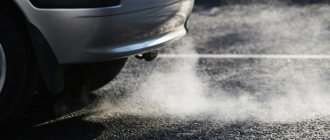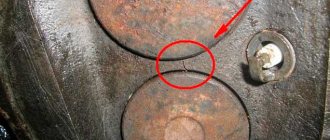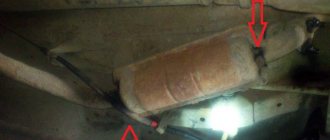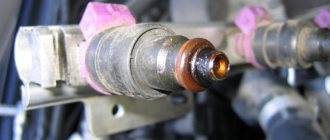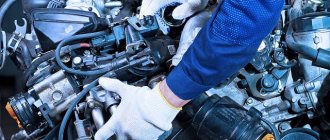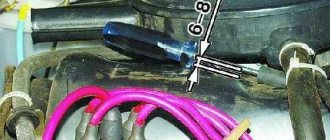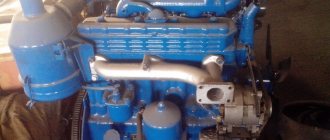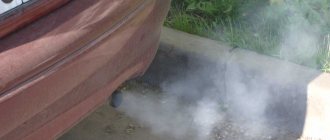Black smoke from the exhaust pipes can be found in all types of engines - running on diesel fuel, gasoline, liquefied gas. If black smoke comes from the exhaust, this means that there is an ignition problem or an over-rich air-fuel mixture. Therefore, black exhaust is, first of all, an indicator of high toxicity of gases, increased fuel consumption and the presence of a problem in the fuel system.
Usually the problem is expressed in the fact that when you press the accelerator pedal (especially “cold” and/or when pressing hard), black smoke comes out of the exhaust pipe. At the same time, the engine often works unstably, “troits”, and starts poorly, especially after a long period of parking (for example, in the morning). In this case, it is necessary to distinguish between the concepts of “black smoke” and “blue smoke”, since these two signs indicate various breakdowns in the engine.
Cause of black smoke from exhaust
It is interesting that, regardless of what type of engine such a misfortune happens to, the common cause in most cases is the same, and it is that a too rich air-fuel mixture is supplied to the combustion chamber. But why, you need to consider a specific type of engine, since a gasoline engine produces much less black smoke than a diesel engine.
In general, the reasons for the appearance of black smoke from the exhaust may be problems with the ignition system, power system, or fuel injection system.
As for the ignition system, the two most common options are problems with the spark plugs or with the coil/coils. If the spark plugs do not produce a spark with the required power, then the air-fuel mixture does not burn completely. The result of this is, among other things, black carbon deposits on the electrodes. And sometimes the spark plugs are completely filled with fuel, making it difficult to start the engine. In a diesel engine, there are glow plugs, and if they are not heated correctly, they cause increased smoke, because the fuel is then not burned.
In a gasoline engine, the result of incomplete combustion of fuel can be the coil. If it is damaged, misfire may occur in individual cylinders.
In the fuel delivery system, problems in this context may be related to the fuel pump and/or fuel injectors. If they partially fail, fuel may be overfilled beyond the norm, resulting in the formation of an enriched air-fuel mixture.
Separately, it is worth focusing on low-quality fuel. Unfortunately, in our realities, many motorists are faced with the fact that gas stations sell low-quality fuel. This applies to all types of fuel - gasoline, diesel fuel, liquefied gas. If there is a significant presence of non-combustible impurities in their composition, the normal operation of the engine will be disrupted, which can lead, among other things, to the appearance of black smoke from the exhaust.
Please note that black exhaust is very toxic and not even a catalytic converter can handle it. However, there are subtleties that are characteristic of certain types of motors.
The main causes of black smoke
Black smoke when starting the engine is not a good sign. Most likely, the vehicle has developed quite large problems within the power unit or related systems. As practice shows, the formation of such an effect on engines is mostly associated with a malfunction of the fuel system.
Thus, the release of one of the elements leads to the fact that the engine begins to flood and the formation of the air-fuel mixture is disrupted.
So, why is there black smoke coming from the engine exhaust pipe? This issue requires deeper consideration. For each engine top, this will be a separate reason, but it is inextricably linked with the formation of the air-fuel mixture. Let's get started.
Black smoke from carburetor exhaust pipe
If an engine with a carburetor has black smoke coming out of the exhaust pipe, the first thing you need to do is check the carburetor itself. Most often, the so-called “overfill” occurs, that is, the amount of incoming gasoline exceeds the norm. In turn, this can happen for two reasons.
The first is that the needle valve (colloquially called a “needle”) is faulty. It simply sticks and excess fuel passes through it. The second reason is clogged jets. They are small diameter nozzles. Often, when using low-quality domestic fuel (or simply over time), they become clogged, causing an over-enriched mixture to be created in the carburetor.
Often, to solve the problem, it is enough to clean it with a carb cleaner. If simple cleaning does not help, you need to buy a carburetor repair kit, which usually includes a new valve and jets. Replace them accordingly. At the end, you need to correctly configure the carburetor and set the gasoline level in the chamber.
Audi 100 › Logbook › Why the car/engine smokes (Causes and methods of troubleshooting)
Every car owner who knows how to reason technically sooner or later asks himself the question “why does the engine smoke?”
Let us first consider this issue in general terms, and then examine each specific case in more detail.
In general terms, the question of why a car smokes can be answered like this:
1) Transparent steam (white) from the exhaust pipe when the engine is running cold or when operating in the cold season is normal.
The oxidation of any carbon fuel ideally produces CO2 and H2O. If CO2 comes out of the engine in the form of a transparent gas, then H2O comes out in the form of superheated steam and, as it cools, turns into a liquid state. It is the condensed water vapor that we observe in the form of smoke from the exhaust pipe.
It is quite easy to verify that water vapor is always present in the exhaust (even when it is transparent and we cannot see it) by a simple experiment: cool a saucepan (or any other dish) and place it under the exhaust pipe of a running engine.
And you will be able to observe how steam from the exhaust gases will condense on the cold walls.
At the beginning of the engine operation, until both it and the exhaust system have warmed up, you can even see dripping from the muffler. In this case, the release system itself plays the role of cold dishes.
It should be noted that water vapor dissipates quite quickly after leaving the exhaust pipe and does not smell of anything.
2) Black smoke from the exhaust pipe - similar to what old loaded trucks driving uphill spew out from their depths (I think this picture is familiar to everyone) is the brainchild of soot.
This is exactly the kind of smoke coming out of the tractor mufflers that you can see in the photo in the header of the page.
In passenger cars, black smoke from the exhaust pipe appears mainly when there is a sharp increase in load, or when driving with a high load. Even logically, it can be determined that the cause is poor mixture formation (mixture over-enriched in fuel). Like any deviation in mixture formation, this leads to excessive fuel consumption. Well, the fuel equipment or the engine control system need to be repaired accordingly.
Smokes black from the exhaust injector
Answering the question why black smoke comes from the exhaust pipe of an injection engine, three main reasons can be identified.
Problems with injectors
On an injection engine, as on a carburetor engine, the injectors become clogged over time, especially when using low-quality fuel. In this case, first a situation occurs when, due to clogged injectors, there is not enough fuel, and then a certain moment comes when the tightness of the needle valve is broken, they begin to let an excessive amount of fuel into the combustion chamber. Naturally, under such conditions the engine will operate unstably, “triple”, the engine speed will “float”, especially at idle.
In this case, it is recommended to clean the injector nozzles. It is recommended to carry out this procedure using special cleaning products every 60...70 thousand kilometers, regardless of what kind of gasoline you use.
Faulty sensors
The operation of the injection engine is based on commands from the electronic control unit (ECU), which, in turn, receives information from sensors located in the engine. Accordingly, if incorrect information is received, the control unit may give a command to form a too rich mixture, which will lead to the appearance of black smoke from the exhaust pipe. What kind of fuel is used, gas, gasoline or diesel fuel, does not matter in this case. In this case, black smoke will only be an external sign of a malfunction. Also, the car will lose its dynamic characteristics, the engine will “trouble”, “sneeze”, and the idle speed will fluctuate.
To diagnose sensors, you can use either a scanner or a regular multimeter. When black smoke occurs when starting a cold engine, then first of all it is worth checking the air flow/pressure sensor, engine temperature, throttle valve, and if on a hot engine, then the oxygen sensor (lambda).
Fuel pump
For cars equipped with injection engines, the fuel pump is located directly in the fuel tank, and from there it supplies gasoline under high pressure to the fuel rail. In rare cases, it happens that the pump produces too high a pressure, that is, higher than necessary, which causes an overflow in the injection chamber, and as a result, black smoke from the exhaust when starting and/or when idling and while driving .
Diagnosing a fuel pump is a rather complicated matter, and it is best to entrust it to specialists. In particular, the pressure and performance they produce are checked using special instruments. Since often increased pressure is produced not only by the pump itself, but by a faulty regulator.
Malfunctions of fuel equipment
The main reasons for engine malfunction, and as a result, an increase in smoke from the muffler, are faulty fuel injectors and a high-pressure pump. The most common defect is the clogging of the injectors with dirt due to low-quality fuel; as a result, normal atomization is disrupted and the injectors begin to “flow.”
Fuel also burns insufficiently due to an incorrectly adjusted injection angle. It is especially dangerous for the engine if the angle is set too early; during long-term operation of a car with early injection, the parts of the cylinder-piston group may suffer, as they will work under increased load.
A common reason for the appearance of black smoke in a diesel engine is uneven fuel supply to the cylinders due to wear of the injection pump plunger pairs. By the way, due to the injection angle being too late, the engine will also smoke black.
On many modern diesel cars, the fuel system is controlled electronically, so it can also be the cause of black smoke from the muffler pipe. This may occur due to an incorrectly configured control unit, which gives the command to supply too much fuel, or faulty fuel system sensors may also be the cause of the malfunction.
Black smoke from diesel exhaust
Please note that the exhaust of even a working diesel engine has a black-blue tint, unlike gasoline or liquefied gas. Therefore, it is necessary to distinguish between the normal amount of exhaust gases and their excessive amount, especially taking into account the fact that the gases have a characteristic black color.
Any diesel engine is characterized by 4 main reasons why black smoke comes out of the exhaust pipe:
- lack of air (both clogged air filter and damage to the intake pipe);
- weak compression;
- leaking injectors (especially noticeable when you press the gas sharply or when driving with a load);
- the injection timing angle is broken (an early angle leads to increased soot formation).
More about these and other reasons below.
Particulate filter
Black smoke from the exhaust of a diesel engine will depend on what environmental standards the car's engine meets. Modern environmental standards, in particular Euro-5, require the installation of a particulate filter, the task of which is to clean exhaust gases from harmful substances. Accordingly, if it fails, black smoke will pour out.
If the particulate filter is partially clogged, black smoke comes out of the exhaust pipe when over-gasping or simply when operating in normal mode. There are two ways out of this situation - replacing the particulate filter or cleaning it.
High pressure pump
In diesel engines, a high-pressure pump (HP pump) is responsible for supplying and dosing fuel. Accordingly, when its work intensity increases, it produces a larger amount of diesel fuel than necessary, which is why an overflow occurs, which also leads to rich black exhaust gases.
On old-type (classic) diesel engines, it is enough to check the operation of the pump - its performance, the output pressure. In modern diesel engines, in particular those equipped with a Common Rail system, it also makes sense to check the operation of the sensors from which information is sent to the electronic engine control unit. Receiving incorrect information from them can also cause black smoke from the exhaust pipe when you sharply press the gas pedal or simply during normal engine operation.
Ignition timing
The point is that in conventional (classical) diesel engine systems the ignition angle may be incorrectly set, including due to chain stretching. This can cause black smoke to appear from the exhaust when it is cold, when it is hot, and in other conditions.
Please note that in modern common rail diesel systems there is no such problem, since the advance angle is set automatically by the engine control unit. If in such a system the angle is lost, it is necessary to check the functionality of the electronic control unit itself, as well as the operation of the sensors that affect the correct operation of the engine.
Turbocharged engines
Engines equipped with turbines have their own nuances. In particular, the turbine may be the cause of the appearance of black smoke from the exhaust pipe. Under normal operating conditions, the pressure should be 0.8...1 atmosphere above standard atmospheric pressure. If the measured pressure is higher or lower than specified, both cases may result in black smoke in the exhaust gases.
Intake tract
A fairly common cause of black smoke from the exhaust pipe is reduced flow of the intake tract. Most often, the critical element in this case is the air filter. It may be blocked for trivial reasons - it was changed a long time ago, not in accordance with the current regulations.
Accordingly, less air passes through it than is necessary for normal operation, while fuel remains at the same level. This means that it is necessary to check the condition of the air filter and, if it is clogged, replace it with a new one.
EGR system
A fairly common reason why black smoke comes out of the exhaust pipe is a faulty exhaust gas recirculation system - EGR (Exhaust Gas Recirculation). The fact is that USR systems are mainly equipped with engines of European cars with a temperate climate. But in severe frosts, the diesel engine does not warm up so quickly, which is why the dampers and servos of the EGR components simply become clogged with soot. After all, the enriched mixture is served longer than usual.
Accordingly, during normal operation, a lot of exhaust gases are returned back to the intake manifold. This naturally leads to a lack of air for the engine, which in turn leads to the appearance of black smoke from the exhaust. If the recirculation system is working properly, then at full engine load it closes completely.
Smoke due to low compression in cylinders
In gasoline engines, the air-fuel mixture is ignited by a spark from a spark plug, and in diesel engines, the mixture is ignited under high pressure in the cylinders. If the compression in the cylinders is insufficient, the engine may not start well, and at low pressure the fuel will not burn completely, which is why black smoke appears. Most often, smoke is noticeable when accelerating a car, when you sharply press the accelerator (gas) pedal.
With low compression, diesel engines cause the car owner the most trouble in winter - “it’s almost impossible to start a “dying” engine even in mild frost without a starting heater.
